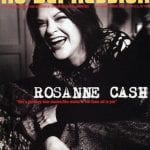Jim McReynolds: 1927 to 2002
Jim McReynolds, the guitar-playing half of Grand Ole Opry and IBMA Hall of Honor members Jim & Jesse, died of cancer in Nashville, Tennessee, on December 31, 2002. He was 75 years old.
With his passing, country music’s longest active professional brother duet came to an end. Born and raised in southwestern Virginia, Jim and younger brother Jesse grew up in a family musical tradition exemplified by Charles McReynolds, their paternal grandfather, who had participated in the historic Bristol recording sessions of 1927. Building a style based on the popular duets of the era — the Monroe Brothers, the Delmore Brothers, the Blue Sky Boys and more — they launched their professional career in 1947, after Jim’s discharge from the Army.
Like many of their peers, the duo started out moving from radio station to radio station every few months, “playing out” a listening area. Jim & Jesse ranged more widely than most, gaining valuable experience and new musical horizons playing western songs in Iowa and Kansas before heading to Middletown, Ohio, in 1951, where they made their first recordings and, remarkably, their first television appearances. The following year, Ken Nelson signed them to Capitol Records, sending them to Nashville for two recording sessions in 1952 and 1953 — the latter squeezed in while Jesse was on furlough from service in Korea.
Though even those first sides served notice that the McReynolds brothers were determined (if low-key) innovators, they spent the remainder of the decade fine-tuning their distinctive sound. Recording for Capitol and then Starday, they used banjo and fiddle, but they also had Jesse’s unique, fluid mandolin cross-picking, which emulated the right hand “roll” of the banjo in ways that sounded strikingly different from Monroe’s style.
Most importantly, they had a smooth, delicious duet, with Jim’s pure, heartbroken tenor soaring over Jesse’s leads. Occasionally supplemented by a third voice, these were close, powerful harmonies that stood apart from the crowd by blending the starkness of the classic brother duet and the high keys of Monroe’s “high lonesome” with the silkiness of western singing groups such as the Sons Of The Pioneers.
Those memorable characteristics would remain part of their music henceforth, as they struggled through a years-long stretch of radio, TV and personal appearances in Florida, Georgia and Alabama, and finally to the Grand Ole Opry in 1964. Recording throughout the 1960s for Columbia and Epic, Jim & Jesse rode the changing fashions of country music, releasing groundbreaking collections of Chuck Berry songs and trucking tunes, and a heartfelt tribute to the Louvin Brothers. They also delivered dazzling instrumentals, wryly comic numbers, social commentaries, and the occasional straight-ahead bluegrass tune.
With one foot planted in commercial country and the other in the growing bluegrass community, they balanced the bluegrass sound of the banjo with pedal steel, piano and the hybrid dobro-banjo. They mixed country shows and bluegrass festivals with quiet creativity, a keen sense of their audiences, and Jim’s memorable combination of business savvy and gentlemanly demeanor.
Pioneers musically, they were willing to strike out on their own in business, too. When their major-label tenure ended in the early 1970s, they were among the first popular country musicians to create their own label, Old Dominion, and they kept it going even as they recorded for bluegrass indies such as CMH, Rounder and Pinecastle. Through the ups and downs of bluegrass’ popularity, they were a constant, steady force, moving away from country fusion to root themselves more deeply in the genre, but always presenting a show that embodied the classic virtues of country’s golden era and the genial intimacy of the bluegrass scene.
By the 1990s, Jim & Jesse were genuine bluegrass legends. Inducted into the International Bluegrass Music Association’s Hall of Honor in 1993, they were given the National Heritage Fellowship Award at a White House ceremony in 1997. Yet their musical boldness remained untamed; their last album, 2001’s Our Kind Of Country, found them exploring the country field once again with an impeccable selection of shuffles and country ballads that took them back to their pre-Opry days, when they’d learned the current Ray Price, Everly Brothers and Buck Owens hits to keep their audiences interested.
“You know,” Jim McReynolds said in a 2000 interview, “when the people come around and ask for your autograph and buy your records, if you talk to them for a little bit, they’ll let you know how they feel about what you’re doing.” From that simple understanding, from a restrained yet powerfully expressive creativity, and from a determined reliance on what strength of character can do in the world of business, he and Jesse built and sustained a quietly brilliant musical career that deserves careful study and unlimited appreciation. His like won’t be seen again.




